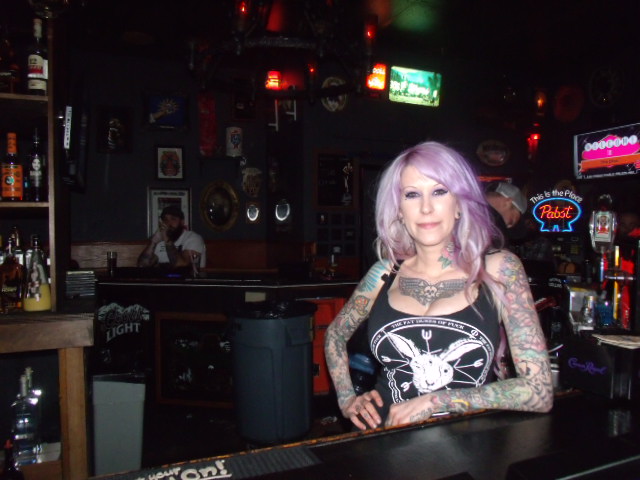You have no items in your cart. Want to get some nice things?
Go shoppingIt’s in here. Come on, this is the place. I know it doesn’t look like much. It’s a dive bar. What are you having? Oh no. You don’t want to order that here. Have a beer. If you’re feeling fancy, have a Jack and Coke, but don’t blame me if your slice of lime is brown.
You know, the other day I found a book of matches in some old papers. Charlie O’s World Famous: Good Drinks And Bad Company Since The War Between The States. Now, Charlie O’s isn’t world famous. It is what it is: a small town dive in New England. The most disreputable bar in a town where you can count the bars on one hand, and they outnumber the traffic lights.
I spent too many of my nights here back in the ‘90s when I was living in my first apartment, working at my first real job, as a newspaper reporter. Living alone for the first time is a strange thing. You cherish that solitude even as you come to fear it. A place like this can be a refuge for you then. All these lost souls, coming together in the light and the warmth and the drink to forget that there is no one waiting for them – or to forget that there is.
The cooks at the Mexican restaurant where I used to work introduced me to the bar. They were an amiable band of losers who ended each shift with contraband daiquiris and a bowl on the deck before ambling across the parking lot to ‘O’s’. As in, “you coming to O’s?”
“Charlie O’s?” I said. “That redneck bar?” It was the one place my freewheelin’ beatnik parents disapproved of. My dad went in for a beer once and reported weird vibes. A friend of theirs went in and a woman tried to pick a fight with her. This was a long time before, in the late ‘70s, when they shut the place down for what the newspaper records as “rowdiness and unpaid taxes.”
“I don’t know,” I said. “I’m not sure that’s my kind of place.” But no one tried to pick a fight with me. Within a week I was a regular.
At Charlie O’s, the screen door has its own particular bang, punctuating each entry or exit like a gunshot. Centuries of Marlboros have stained every surface a mellow brown. There are two shitty pool tables, a couple of pinball machines and a single table that gets pushed to the back when bands play. Once your eyes adjust to the low light, you’ll notice that the walls are covered with framed photographs and an unbelievable number of printed signs – they’re even on the ceiling. The signs are inscribed with gems from the treasury of beer cosy wit and wisdom: “FREE BEER HERE… tomorrow.”
There’s a sign behind the bar that says “no life stories” but I’ve never seen it enforced.
The bartenders at that time were all formidable women, with arms strong enough to swap out their own kegs and highly articulated bad sides you didn’t want to get on. I got to know them all. After work I’d go down when it was still quiet. My apartment was in the building three doors down, so the bar was essentially my living room. I’d eat dinner and then go down and sit on a barstool and write in my journal, puzzling out my complicated twenty-something problems, until I was ready to talk.
I was propping up the bar with a motley crew – but isn’t it always? Kurt of the handlebar moustache and conspiracy theories. Dave, the high school hockey star who ended up painting houses instead of playing right wing for the Canadiens. Stacy, a waitress who had the dirt on everyone and always asked us back to her place for a grilled cheese. Many more, their names forgotten. You learned who got funny after their second beer. You learned who got mean, and when to make yourself scarce.
Charlie O’s was traditionally a good old boys’ bar. And there are always plenty of guys who go to deer camp and own snowmobiles. The signs on the bathroom doors say ‘buck’ and ‘doe.’ But you’re just as likely to find: politicians from the Vermont Statehouse, bikers, deadheads and trustafarians, culinary school students, teachers out on a school night, and a toothless man who probably just crawled out from a woodpile somewhere on Route 302. All interrupting each other’s conversations and buying each other drinks.
Nobody cares who you are here. They care whether you’re up for shooting a little pool. Whether you know someone who will plow their driveway in exchange for maple syrup. They care what you think the best song on Led Zeppelin IV is. And whether or not you’ll dance with that old guy. He always shows up for the Starline Rhythm Boys, the honkytonk three piece that serves as the house band. He might be an old man, but he can really move. You dancing? He’s asking. I really think you should.
*
Some people don’t feel at home in a town until they have a library card. Others have to learn their way around the supermarket. For me, it’s the dive bar. Until I’ve found the dive bar, I don’t feel like I can really belong to a place.
They differ from city to city, and from one continent to another. But there are universal qualities they all share. Here’s what to look for: darkness. Cracked vinyl booths, sticky tabletops. Cheap beer. A good jukebox. Unusually dirty bathrooms with unusually good graffiti. And so they attract the kind of people who value good graffiti more highly than clean bathrooms: nighthawks, deadbeats and characters. For those of us who love them this is a large part of their allure.
The other thing is this: sitting in a dive bar can elevate the act of having a drink into a kind of high art. That’s the deal. They let you borrow some of their romance. Here, it’s easy to see yourself as the hero or heroine of the black and white movie version of your life. It only gets easier as the night goes on. And everyone you meet has a story. Maybe that’s why they need a sign that says ‘no life stories.’ People come here ready to tell them. There’s something about a place like this that makes it possible to get under a person’s skin and have the kind of conversation you’ll both remember years later. Even if you’d never met them before. Even if you never see them again.
New York City has the best dive bars in the world. Holland Bar in Hell’s Kitchen, an ancient hole in the wall where you can still get a beer for three bucks. Dublin House on West 79th, which opens at 8 a.m. in case you want to stop off for a swift one before work. And the Subway Inn on East 60th. It’s where Joltin’ Joe DiMaggio used to take Marilyn Monroe for a nightcap after dinner at Gino’s Italian restaurant. It’s also where I met my husband on one of those nights when you give yourself up to the gods of the dive bar. One of those nights where you put yourself in the palms of their calloused hands knowing that you might get a kiss or you might get a sock in the eye.
The gods were in a good mood that night.
But that’s what I’m talking about. The enduring promise of the dive bar is that these strangers, these nameless walk-on parts in the background of our movie will become fourth-beer friends. Maybe they really will become your friends, in that bright world on the other side of closing time. Maybe you’ll marry them. Maybe you’ll never see them again. It’s up to you, and the night, and the sleazy, swaybacked gods of the dive bar. Anyway, I’d better get home. It’s almost last call. I’ll see you around. And hey, don’t forget to tip the bartender.

About Kate Feld
Kate Feld is an American writer living outside Manchester. She lectures in journalism at the University of Salford and works for Manchester Literature Festival. Her essays have been published in Caught by The River and the Flax Books creative nonfiction anthology Mostly Truthful. Her fiction has appeared in Neon and won the 2014 Flashtag Short Short Story Slam. She co-edits The Real Story (@realstoryuk), an online creative nonfiction journal and reading series in Manchester.





